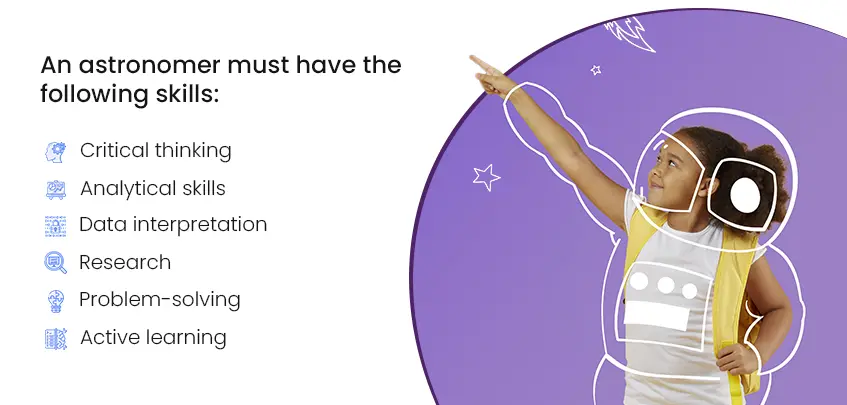career
Navigate the galaxies for a career in astronomy
Discover what it is to be an astronomer by immersing in a virtual world.


How do 360° career videos benefit learners?

Who is an astronomer?
An astronomer is someone who studies the universe, as in the physical and chemical properties of anything that is outside of the earth’s atmosphere. They study the evolution of stars and different planets to understand how they were created and what will happen as they age. Back in the day, astronomers used to observe the night sky to make predictions about celestial phenomena and study what is outside the earth’s atmosphere. Some notable names in the field of astronomy are Galileo Galilei, Sir Isaac Newton, and Charles Messier, among many others.
Before diving deep into who an astronomer is and how to be an astronomer, it is important to understand the subject that is astronomy. What is it? Well, astronomy is the study of the uncountable things that exist in the universe like stars, planets, galaxies, and the solar system, generally known as celestial bodies. Astronomy is amongst the oldest branches of science. It integrates the knowledge of mathematics, physics and chemistry. Modern day astronomy has two distinct divisions, theoretical astronomy and observational astronomy.
Theoretical astronomy: In this field of astronomy, several astronomical phenomenons and positions of celestial or cosmic objects are explained using different analytical methods.
Observational astronomy: All the possible data related to the universe that can be observed is collected. Usually, a group of astronomers work together to observe objects such as stars, other galaxies, black holes, etc.

Fields within astronomy
Astronomy is divided into different fields. Examples of specialties in astronomy are solar astronomy, planetary astronomy, extra-galactic astronomy, stellar, and cosmology. Astronomers usually choose to focus on one of these fields.
Each field branches into either an observational or theoretical type of study. Each of the branches are different yet complement one another, with theoretical astronomy being used to explain observational results and observational astronomy confirming the results obtained through theoretical analysis and computer modelling.
Astronomy can also be divided according to its links with other fields of science. Astronomy can apply physics, biology, and geology to explain the origin and evolution of space, stars, and celestial bodies. Those four sub fields are astrophysics, astrometry, astrogeology, and astrobiology.
Roles and responsibilities of an astronomer
Astronomers spend most of their time analyzing data, working on research papers, and creating computer programs that allow a more effective analysis of the data being collected from satellites.
Some of the other roles and responsibilities of an astronomer are:

Being an astronomer
Job opportunities
Depending on your preference, you can either choose to work in the field or choose the academic route to educate others. Some of the opportunities that you can consider are:
You can work at an observatory
Observatories will offer you an opportunity to interact with the public in the role of a resident astronomer. The job generally entails curating astronomy exhibits and writing books or papers on specific areas in astronomy.
You can apply for positions in the aerospace or computer science industry
These positions offer the option to work in an area other than academia. This may be an ideal role for you if you prefer to work directly with other astronomers and scientists.
You can work at a space agency
Working for a space agency will allow you to collaborate with other scientists and astronomers on the study of the universe and various known and unknown elements of space.
You can teach others about space
No, astronomers don’t just work at NASA. If you aspire to become an astronomer, a career goal could be to work at NASA, but there are various other roles that you can experience as an astronomer, depending on your field. If you want to teach, a typical classroom setting would be common. Often, you would also be invited to give talks and conduct seminars at different institutions.
You can research big questions about the universe
Working in an office usually involves doing administrative work or research work. Research could involve calibrating and analyzing data, running numerical models, or testing out different theories. Much time is spent in front of a computer, therefore familiarity with computers and programming is a necessity if you’re considering this career. Astronomers also spend a lot of their time reading new subjects and writing research papers and might also have to travel several times for meetings and conferences.
Pros & cons of being an astronomer
Like almost every other career path, the field of astronomy also has its own set of benefits and challenges. Let’s discuss some of them:
Pros
Cons
A curious mind may have immense potential to be an astronomer. Exposing them to the right information at the right age can make a world of difference. Take learners on an immersive 360-degree career journey into the captivating field of astronomy. Through these videos, students can witness the wonders of the universe, explore cutting-edge research, and gain insights into unraveling the mysteries of the cosmos. Join us on this cosmic adventure and ignite the passion for astronomy in your students.
Empower learners to reach for the stars, explore the unknown, and contribute to the vast tapestry of human knowledge that lies beyond the earth's atmosphere.

Get stories selected just for you, right in your inbox.

Get stories selected just for you, right in your inbox.
This might interest you











